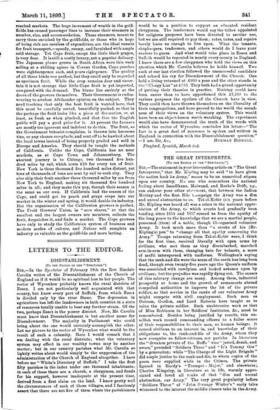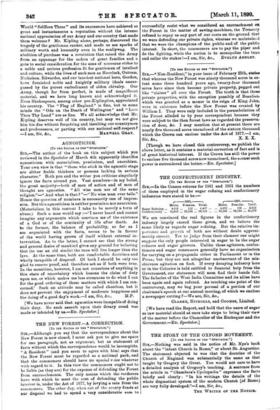THE GREAT INTERPRETER.
[To TEl EDITOR OF TEl " SPECTLTOR."3 SIR,—The statement in your interesting article on "The Great Interpreter," that Mr. Kipling may be said "to have given the nation back its Army," seems to be an unmerited stigma upon our country. No one who remembers the national feeling about Isandlhana, Maiwand, and Rorke's Drift, e.g., can endorse your other statement, that between the Indian Mutiny and the first Nile Campaign the Army was a dim and unreal abstraction to us. Tel-el-Kebir (six years before Mr. Kipling was heard of) was a crisis in the national appre- ciation of the Army, to which events had gradually been tending, since 1834 and 1857 roused us from the apathy of the long peace to the knowledge that we are a martial people, possessed (then) of a noble, though ill-organised volunteer Army. It took much more than "a stroke of his (Mr. Kipling's) pen" to "change all that apathy concerning the Army." Troops returning from Tel-el-Kebir were, I think for the first time, received literally with open arms by civilians, who met them as they disembarked, marched arm-in-arm with them, changing hats for helmets, a mass of mufti interspersed with uniforms. Wellington's saying that the rank-and-file were the scum of the earth has long been dead, though even twenty-five years ago the Queen's uniform was associated with rowdyism and looked askance upon by civilians ; but the prejudice was rapidly dying out. The causes of this salutary change are many. Among them, industrial prosperity at home and the growth of armaments abroad compelled authorities to improve the lot of the private soldier, so that service in the ranks of our volunteer Army might compete with civil employment. Such men as Outram, Gordon, and Lord Roberts have taught us to value the private soldier. Such unobtrusive work as that of Miss Robinson in her Soldiers' Institutes, Ix., must be remembered. Besides being justified by results, this un- selfish work roused commanding officers to a fuller sense of their responsibilities to their men, as human beings ; it roused civilians to an interest in, and knowledge of their obligations to, the rank-and-file of the Army, whom they now recognise as fellow-citizens, not pariahs. In literature the "drunken private of the Buffs" who "jested, drank, and swore," preceded "Soldiers Three" and "It's Tommy this" by a generation; while "The Charge of the Light Brigade" did ample justice to the rank-and-file, to whom copies of the poem were supplied while in the Crimea. The private figured in Hardy's "Trumpet . Major," and elsewhere ; Charles Kingsley, in literature as in life, warmly appre- ciated and loved all ranks of that "dim and unreal abstraction, our Army." The very great popularity before "Soldiers Three" of "John Strange Winter's" early tales witnessed to the interest the middle classes take in the Army. Would "Soldiers Three" and its successors have achieved so great and instantaneous a reputation without the intense national appreciation of our Army and our country that made them welcome P Mr. Kipling alone, perhaps, discovered the tragedy of the gentleman ranker, and made us see sparks of military worth and humanity even in the scallywag. The abolition of purchase was a revolution that raised the Army from an appanage for the cadets of great families and a gate to social consideration for the sons of nouveaux riches to a noble and serious profession fit for gentlemen of intellect and culture, while the lives of such men as Havelock, Outram, Nicholson, Edwardes, and our late-lost national hero, Gordon, have furnished noble and knightly military ideals unsur- passed by the purest embodiment of olden chivalry. Our Army, though far from perfect, is made of magnificent material, and we have long known and acknowledged it. Even Shakespeare, among other pre-Kiplingites, appreciated his country. The "Flag of England" is fine, but to some minds the "Ode on the Death of Wellington" and "Love Thou Thy Land" are as fine. We all acknowledge that Mr. Kipling deserves well of his country, but may we not give him his due without forgetting and insulting our countrymen and predecessors, or parting with our national self-respect P







































 Previous page
Previous page